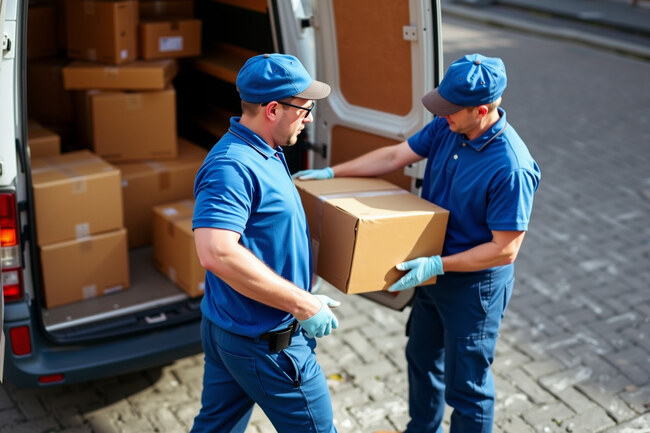The impact of GPS on logistics: Boosting delivery speed and customer satisfaction
Ramya Sriram
8 min read
11th Nov, 2024
GNSS applications

It’s a busy Thursday evening in London, and Matt, an Amazon delivery driver, is navigating through heavy traffic, armed with his smartphone and in-vehicle satnav. As the minutes tick down, he’s acutely aware that even minor delays could derail his entire route and impact his role performance. For Matt and thousands of drivers like him, the difference between meeting delivery windows and falling behind highly depends on GPS accuracy. The story of Matt’s journey illustrates a bigger picture: how GPS technology has become a game-changer for logistics across retail delivery, takeaway services, and field sales.
The vital role of GPS in logistics
The logistics industry, encompassing giants like Amazon and Deliveroo, heavily relies on GPS technology to streamline operations, improve efficiency, and reduce costs. Fuel is one of the largest expenses in this sector, accounting for about 10% of total last-mile delivery costs. Therefore, the impact of navigation accuracy on operational efficiency is significant, necessitating a focus on how precise GPS positioning can influence business costs and performance.
According to the World Bank, around 56% of the world’s population currently live in cities. By 2050, this number is expected to increase to nearly 70%, with urban populations projected to double. This rapid urbanisation places immense pressure on logistics networks to deliver goods swiftly and accurately, making GPS accuracy more important than ever. Recent innovations like the ‘peel and stick’ label leverages GPS to provide real-time visibility and tracking of shipments – which highlights the importance of GPS for monitoring the movement of goods.
The cost of poor positioning
GPS is the US system of a broader satellite technology, Global Navigation Satellite Systems (GNSS), which provides worldwide position, time, and velocity information. The cost of inaccurate positioning can be significant, leading to safety concerns and substantial economic losses due to inefficient routing, increased fuel consumption, and delays. In the UK alone, the economic impact of a loss of GNSS for 7 days was estimated to be at £7.64 billion.
For companies like Amazon, which ships 1.6 million packages daily, each driver is expected to deliver between 250-300 packages to around 200 stops, which demonstrates that operational efficiency is crucial for success.
The applications of GPS in logistics
Enhancing customer satisfaction
In the world of retail delivery, GPS doesn’t just guide drivers – it’s integral to the customer experience. Almost every food delivery service, from Deliveroo to Domino’s, has implemented GPS tracking to provide live updates on orders. This integration is vital for keeping food fresh and customers informed. Domino’s offers “pinpoint” delivery, allowing customers to simply drop a pin where they are to get their pizza delivered to the location. In cases like these, GPS accuracy is critical. Poorly-designed GPS apps can also cost delivery drivers their jobs, as in the case of Just Eat.
Worker protection
Employers are responsible for the health & safety of their employees including remote teams working ‘out in the field and where open communications is essential. Plans need to be in place in the event of workplace risks, such as accidents, health emergencies, and personal safety threats, especially if they travel to sensitive or remote locations. GPS tracking plays a crucial role in protecting sales workers by enhancing their safety, monitoring their location in real-time, and ensuring swift responses in case of emergencies. Companies like PeopleSafe and SoloProtect offer devices that include features like discreet SOS buttons and a “Man Down” alert for falls. For sales teams frequently on the move or working alone, GPS tracking allows employers to know their exact locations, making it easier to dispatch help if they are in unsafe areas or face unexpected incidents, such as vehicle breakdowns or health emergencies. Additionally, GPS can help verify travel routes, reducing the risks of visiting unsafe neighbourhoods or violating travel-related protocols. This technology also encourages accountability and transparency, as it helps managers allocate their resources effectively.
GPS accuracy: Challenges in the logistics sector
Urban navigation and multipath interference
GPS signals can be compromised in urban environments due to signal obstruction and multipath interference, when satellite signals reflect off buildings, trees and other obstacles before reaching the receiver. This can lead to poor positioning, making it difficult for companies to monitor driver locations and performance. Foliage can also weaken signal strength.
Multipath is one of the main challenges of GNSS in logistics. As logistics businesses dispatch drivers in complex urban landscapes, they require systems that function seamlessly in all operational environments to maintain high levels of customer service and operational efficiency.
GPS spoofing
A concerning rise in GPS spoofing, where criminal networks broadcast fake satellite signals, poses a serious threat to logistics operations. Spoofing attacks can confuse GNSS receivers, leading to potentially harmful disruptions in positioning systems. Spoofed signals can mislead navigation systems, impacting not only deliveries but also the safety of passengers, vehicles and other road users.
The path forward: Innovations in GPS technology
Today’s GNSS receivers must be accurate, reliable, and secure in all environments, including urban centres and dense suburban areas. To address these challenges, GNSS technology can be enhanced using modern signal processing and machine learning techniques.
FocalPoint’s GNSS positioning software is an upgrade to existing receivers and works at the chipset level. With the ability to mitigate the impact of multipath in urban areas and detect and mitigate spoofing threats, it significantly improves the accuracy, reliability and security of GPS. As we advance towards a more interconnected and urbanised world, the role of GPS will only grow in importance, enabling companies to meet rising consumer expectations while improving operational efficiency. With the ability to minimise fuel spends and optimise routes, GPS accuracy will also play an important role in sustainability.
Imagine a world where delivery drivers like Matt consistently meet their sales and delivery targets with ease and minimal stress. This directly leads to a more efficient business and happier customers. What’s not to like?
—







